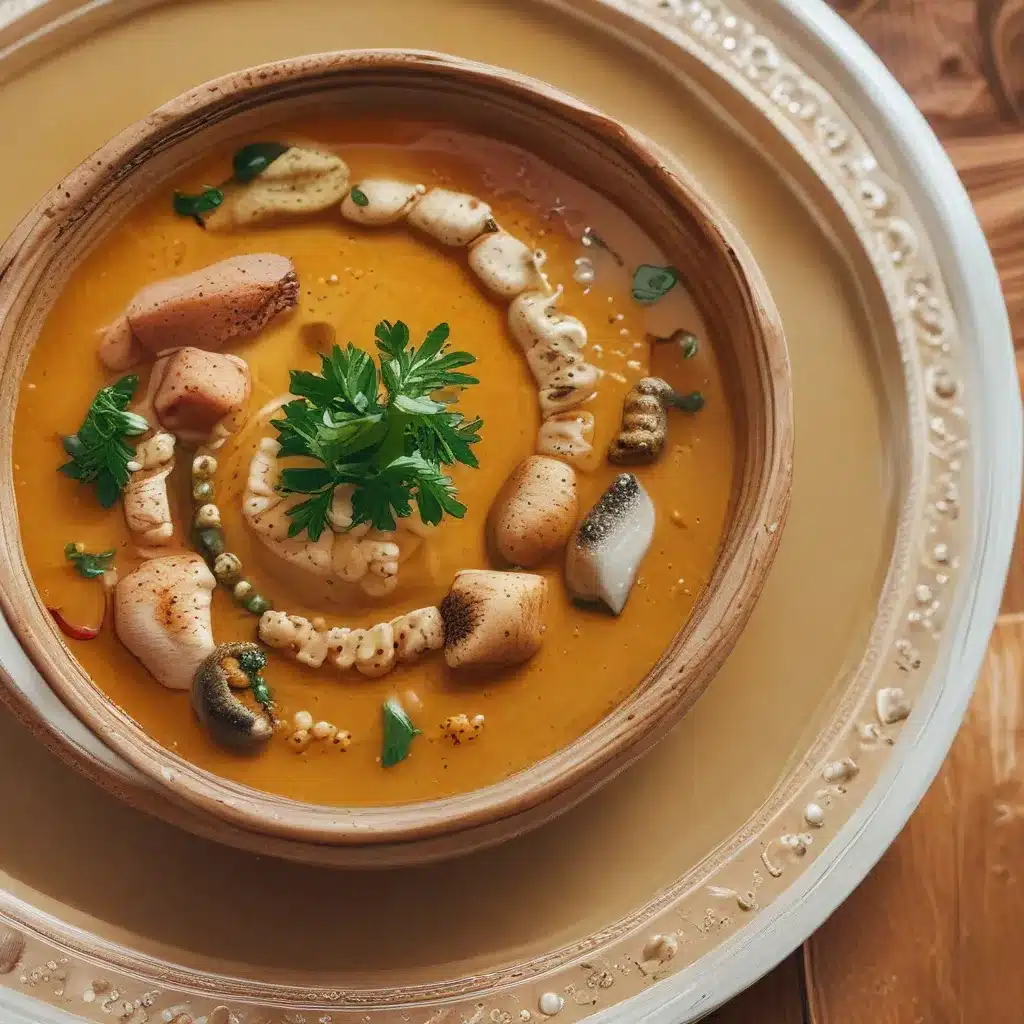
The Joy of Finding a Hidden Culinary Treasure
I’ll admit it – I’m a bit of a foodie snob. There, I said it. I’m always on the hunt for the next big thing, the latest trendy dish that’s about to explode onto the scene. But sometimes, the real gems are hiding in plain sight, just waiting to be discovered. That’s exactly what happened when I stumbled upon the magic of Moroccan harira soup.
A Spice-Filled Journey
Now, I consider myself a pretty adventurous eater. I’ve tried everything from the most avant-garde molecular gastronomy creations to the most humble, homestyle dishes around the world. But somehow, this classic Moroccan soup had managed to elude me for years. That is, until I found myself in New York City, wandering the streets of the bustling Moroccan neighborhood, drawn in by the tantalizing aromas wafting from the local restaurants.
One particular establishment, El Bahia, caught my eye. The vibrant blue and white tiles, the intricately carved wooden furniture, and the cheerful chatter of the patrons – it all seemed to transport me straight to the souks of Marrakesh. I knew I had to try their harira soup.
A Culinary Revelation
As soon as the bowl was placed in front of me, I knew this was no ordinary soup. The rich, velvety broth was a deep, mahogany color, infused with a symphony of warming spices – cumin, cinnamon, turmeric, and more. Floating in the liquid were tender lentils, buttery chickpeas, and delicate strands of vermicelli pasta, creating a satisfying, hearty texture.
But the real magic happened when I took that first spoonful. The flavors exploded on my tongue, a perfect balance of savory, slightly sweet, and subtly spicy. It was like a hug for my taste buds, comforting and familiar, yet completely unique. I couldn’t believe I had been missing out on this culinary treasure for so long.
A Tale of Tradition and Transformation
As I savored each bite, I couldn’t help but wonder about the history and cultural significance of this dish. Turns out, harira is the national soup of Morocco, a staple enjoyed throughout the year but especially during the holy month of Ramadan, when it’s served to break the daily fast.
The origins of this soup can be traced back centuries, with each region and household putting their own spin on the recipe. Some versions incorporate lamb or beef, while others, like the one I was enjoying, are entirely vegetarian. And the addition of that silky egg-lemon sauce? Apparently, that’s a touch learned from Moroccan Jews who immigrated to places like Montreal.
A Soup for All Seasons
As I slurped down the last dregs of my harira, I couldn’t help but marvel at the versatility of this dish. It’s the ultimate comfort food, perfect for warming the soul on a chilly winter day. But with its bright, fresh herbs and vibrant spices, it also makes for a refreshing, light meal in the warmer months.
Whether you prefer it with meat or want to keep it plant-based, harira is a dish that can be endlessly customized to suit your tastes. Swap in different grains, play around with the vegetable selection, or experiment with the spice blend – the possibilities are endless.
Discovering a New Culinary Passion
As I stepped out of El Bahia, soup-satisfied and heart full, I couldn’t help but feel a sense of gratitude. This chance encounter had not only introduced me to a new favorite dish, but it had also reignited my passion for exploring the rich and diverse culinary traditions of the world. Who knows what other hidden gems are waiting to be discovered at El Bahia and other Moroccan restaurants in New York City?
From now on, I’ll be sure to keep an open mind and a curious palate, because you never know when the next culinary revelation might be just around the corner. Moroccan harira soup has certainly set the bar high, but I can’t wait to see what other delicious adventures await.
The Art of Slow Savoring
One last thing I’ve learned about harira soup – it’s a dish that’s best enjoyed slowly, with a little bit of ritual and ceremony. The rich, complex flavors reveal themselves over time, like a symphony unfolding. So next time you have the chance to indulge in this Moroccan treasure, take your time. Sip, savor, and let the comfort of this soul-warming soup transport you to a different place and time.


